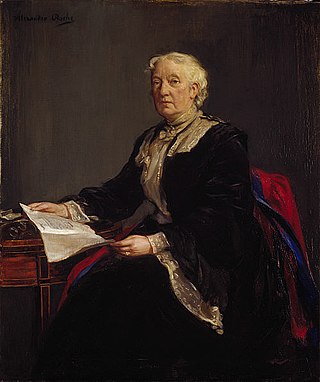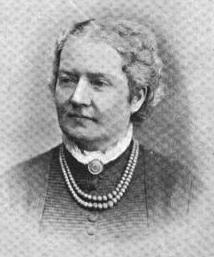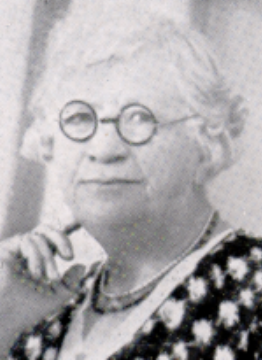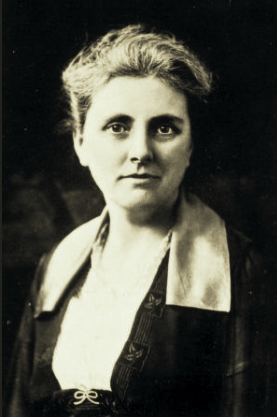
Flora Clift Stevenson was a British social reformer with a special interest in education for poor or neglected children, and in education for girls and equal university access for women. She was one of the first women in the United Kingdom to be elected to a school board.

Louisa Stevenson was a Scottish campaigner for women's university education, women's suffrage and effective, well-organised nursing. She was the co-founder of Edinburgh’s Queen Margaret University.
Florence Marian McNeill, was a Scottish folklorist, author, editor, suffragist and political activist. She is best known for writing The Silver Bough, a four-volume study of Scottish folklore; also The Scots Kitchen and Scots Cellar: Its Traditions and Lore with Old-time Recipes.

Anna Gillies Macdonald Munro was an active campaigner for temperance and the women's suffrage movement in the United Kingdom. Munro organised and was the secretary of the Women's Freedom League campaigning in Scotland. She settled in Thatcham after the First World War but was living in Aldermaston by 1933 and died in Padworth, Berkshire in 1962. She had affordable housing named after her in Thatcham.

Marion Gilchrist was the first female graduate of the University of Glasgow, one of the first two women to qualify in medicine from a Scottish university; and a leading activist in the Women's suffrage Movement in Scotland. In recognition of her achievements she has been honoured in a number of ways.

Jane Arthur, was a Scottish feminist, philanthropist and activist. She was the first woman to be elected to a Scottish school board.

Eliza Wigham, born Elizabeth Wigham, was a Scottish campaigner for women's suffrage, anti-slavery, peace and temperance in Edinburgh, Scotland. She was involved in several major campaigns to improve women's rights in 19th-century Britain, and has been noted as one of the leading citizens of Edinburgh. Her stepmother, Jane Smeal, was a leading activist in Glasgow and together they made the Edinburgh Ladies' Emancipation Society. Her brother John Richardson Wigham was a prominent lighthouse engineer.

Christian Edington Guthrie Wright was a Scottish campaigner for women's higher education, co-founder of the Edinburgh School of Cookery which was the forerunner to Queen Margaret University.
Anna Lindsay was a Scottish women's activist. She was one of the founders of the Glasgow Association for the Higher Education of Women and her name was said to be synonymous with the women's movement in Scotland. She was the first chairperson of the Scottish Women's Liberal Federation.

The Glasgow and West of Scotland Association for Women’s Suffrage was an organisation involved in campaigning for women’s suffrage, based in Glasgow, with members from all over the west of Scotland.

Elizabeth "Dorothea" Chalmers Smithnée Lyness was a pioneer medical doctor and a militant Scottish suffragette. She was imprisoned for eight months for breaking and entering, and attempted arson, where she went on hunger strike.

Jane E. Taylour was a Scottish suffragist and women's movement campaigner, and one of the first women to give lectures in public. She travelled around Scotland and northern England as a suffrage lecturer, and was a key figure in spreading the message of the women's suffrage throughout Scotland and inspiring others to join the National Society for Women's Suffrage.
Isabella Bream Pearce was a socialist propagandist and suffrage campaigner. She was the vice-president of the Glasgow Labour Party, president of the Glasgow Women's Labour Party, and a member of the Cathcart School Board.

Dr Elizabeth Pace was a Scottish medical doctor, suffragist and advocate for women's health and women's rights.

Barbara Steel ; 1857 – 22 December 1943) was a Scottish social activist who actively campaigned for Women's Suffrage in both the United Kingdom and South Africa. She was the first woman to stand in an election for the Edinburgh Town Council, when she ran in the 1907 election. Steel moved to South Africa in 1911 and at the beginning of World War I founded an organization to provide aid to South African soldiers and their families. She was honored as an Officer in the Order of the British Empire for her civil service. In addition, she served as president of the Women's Enfranchisement Association of the Union from 1916 until 1930, fighting for women's right to vote in South Africa.

Women's suffrage was the seeking of the right of women to vote in elections. It was carried out by both men and women, it was a very elongated and gruelling campaign that went on for 86 years before the Representation of the People Act 1918 was introduced on 6 February 1918, which provided a few women with the right to vote.

Jessie Margaret Soga, LRAM was a Xhosa/Scottish contralto singer, music teacher and suffragist. She was described as the only black/mixed race suffrage campaigner based in Scotland. Soga was a lead member of the Women's Freedom League in Glasgow and later joined the Women's Social and Political Union; but did not carry out militant activity, using her organisational skills and musical talent to raise funds.
Ada Broughton (1879–1934) was a British temperance campaigner, suffragette organiser and Labour councillor and alderman, prominent in Scotland in the Women's Freedom League, and in England in the Pembroke Chapel, British Women's Temperance Association, Women's Social and Political Union, and later in the Labour Party.

Deborah Knox Livingston was a Scottish-born American lecturer associated with temperance and suffrage movements. She spent much of her life in service to the National and World's Woman's Christian Temperance Union (WCTU), as well as the Young Women's Christian Association (YWCA), Federation of Women's Clubs, League of Women Voters, and World League Against Alcoholism (WLAA). In Maine, she served as the chair of the state's Suffrage Campaign Committee, while in Rhode Island, she was President of the state's WCTU. In addition to the textbook, Studies in Government (1921), Livingston was the author of several treatises and articles.














